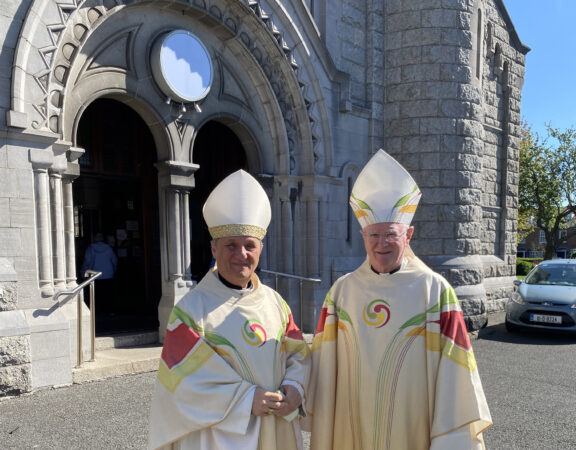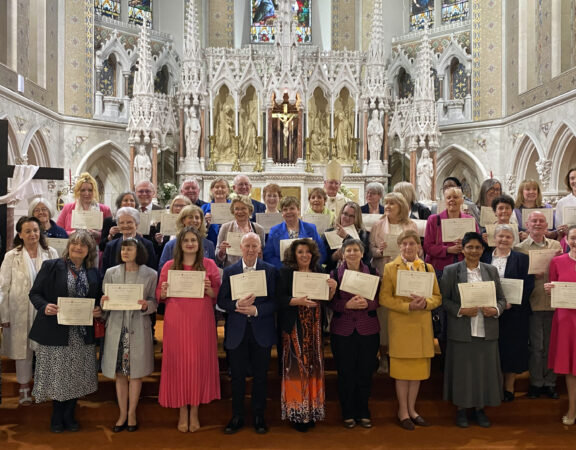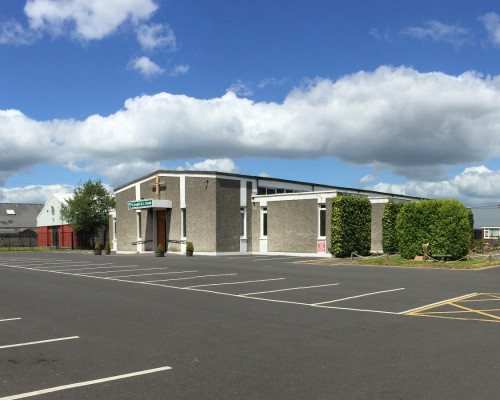NATIONAL RELIGIOUS EDUCATION CONGRESS
“I arise today”
Speaking Notes of
Most Rev. Diarmuid Martin
Archbishop of Dublin and Primate of Ireland
———–
Saint Patrick’s College, Drumcondra, Dublin
.
It is always a great pleasure for me to come here to this Church of Saint Patrick’s College, Drumcondra, as it is the Church in which I was ordained a priest.
The life of the Church has changed greatly since that day back in 1969. This Conference has the opportunity to look at what has changed: the extraordinary changes for the good in Ireland and in the Church; but also at what we have lost in our appreciation and living of the faith. We look especially towards the future, where Religious Education will be at the heart of our evangelization.
It would seem that for many people in our generation faith in Jesus Christ appears more difficult than at other periods in history. Many young people have drifted away, at times one might think definitively, both from the practice of their faith, as well as from finding an essential link between the message of Jesus and their lives, beyond a broad cultural recognition of the basic human values which even a non-believer might find in the message of Jesus.
Many young people may be interested in the message of Jesus, but they feel that the Church is not the place where they will find the essence and the practice of that message. Others are happy with what a secular vision provides for them; they feel that it gives them sufficient sense of purpose, a desire to be caring, honest and good. They live a caring, generous and dutiful life, but in many ways they live “as if God did not exist”.
How and where can religious education reach the members of a generation which has drifted from faith, even though they have gone through many years of religious instruction in schools? That is our challenge.
I would like to start by making the somewhat obvious, but also programmatic, observation that the religious education we are concerned with is precisely education about Jesus Christ. Religious education is not about a book of rules or a code of ethics; it is not about feeling good or simply about doing good. Religious education is about a person, Jesus Christ. His is a message which does not derive from human reasoning but comes because he lives face to face with the Father, and reveals God’s identity to us through a life of self-giving love. Deus caritas est!
The first task of the Catholic religious educator is to present the person of Christ to all. Familiarity with the Gospels should be the first priority for those involved in religious education. The story of Jesus, his words and deeds and gestures of love, and the stories he told have the capacity to touch hearts today as they have through history.
Jesus must always be the starting point and goal of Christian religious education. The religious educator is challenged to present the person and the message of Jesus in ways that are true and faithful to him and which at the same time address the hopes, longings and questions of people who live in a world that is very different to Israel two thousand years ago.
What Pope John Paul II said of Europe in general is no less true of Ireland: “Many Europeans today think they know what Christianity is, yet they do not really know it at all. Often they are lacking in knowledge of the most basic elements and notions of the faith“ (Ecclesia in Europa, #47). Religious education must never avoid the task of teaching about Jesus, who, as Pope Benedict XVI says in his book Jesus of Nazareth “lives before the face of God, not just as a friend, but as a Son”, and who alone can bring us with him into his intimate relationship with the Father.
All of us are aware that we have much to do to raise basic levels of religious knowledge. I believe it is appropriate that we might seek to establish criteria concerning the levels of knowledge we might reasonably expect from children at different stages of their education. I am convinced that there is also a role in religious education for teaching basic prayers to children – this is especially the case when we can no longer be certain that this will always happen in the home. Such prayers belong to our basic Christian heritage.
Knowledge alone, however, can never become an end in itself. It is important that we do not lose sight of the evangelical nature of Catholic catechesis. The religious educator is never simply a competent expert who imparts “information concerning religion” to his or her students. The best religious educators seek to invite their students to a personal encounter with the living God, who is Father, Son and Holy Spirit.
Religious education has an important contribution to make to Irish society. We are called to speak to a world which increasingly prizes success and which stresses self sufficiency. To that world we bring the message of one who was rejected and led to death on the cross. A world which only prizes success is both an inhuman and a godless world. . We need not just material success. We need to be present with the Christian message in the world of human weakness, witnessing to the possibility of healing and reconciliation and salvation.
In the Old Testament text to which we have just listened, Elijah has grown weary in his task and is ready to give up but the angel of the Lord nourishes him and gives him the strength to continue on his journey. This account reminds us that the Gospel we proclaim is not just good news for those to whom we proclaim it but is also the source of our own strength and hope. I ask the Lord’s blessing on this gathering – I trust that the speakers and presenters chosen by Bishop Drennan and the organizing committee will inspire, challenge and provoke all of you to reflect on religious education and on the faith that enables us to face the future with confidence.
It is a long time now since my priestly ordination here in Saint Patrick’s College, Drumcondra, in 1969. The College, rich in history and tradition, which had been for decades a vital structure in the preparation of teachers, had been completely renovated. It was stunningly modern for its times. This Church was one of the most modern Churches in Ireland.
Renovation, renewal, returning to our roots are all a vital and constant part of the process of religious education. Renewal continues in our day. May our reflection and prayer in these days be a source of renewal of our knowledge of, faith in, and intimacy with Jesus Christ, the way the truth and the life









